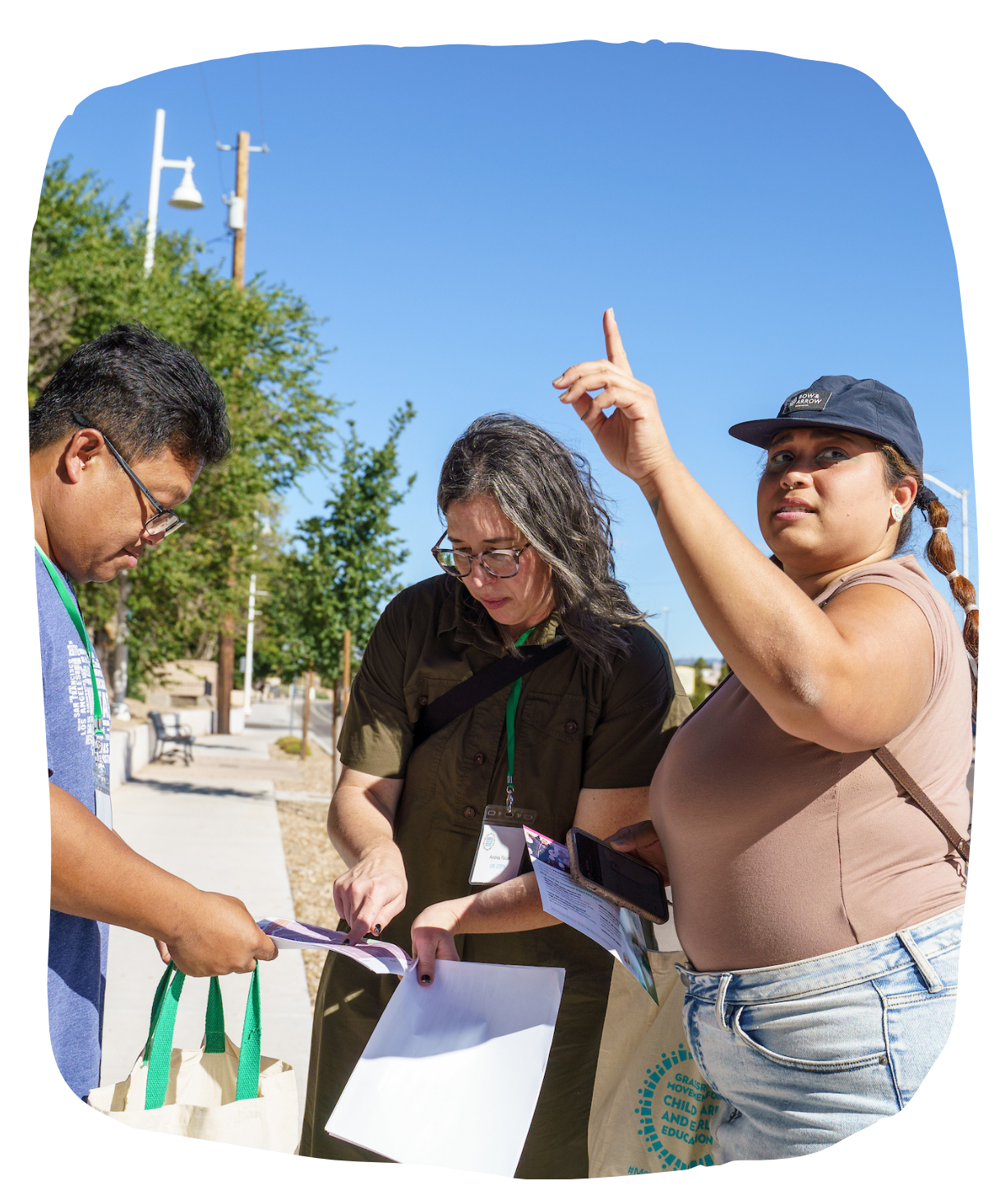OUR SHARED VISION & GOALS FOR CHILD CARE

Our vision is a country where every family has equitable access to a publicly-funded care and learning system that that serves children 0-13+, provides infant, toddler, preschool and school-age care in a comprehensive way that prioritizes children’s safety, development, and well-being; and that the child care workforce is compensated in a way that reflects the critical value of their work, and has a voice in the profession they love.
Our goals as a network are to…
➡️ Redefine child care, early education, and the care and learning workforce as fundamental to children’s well-being, families’ ability to thrive, and a robust economy;
➡️ Dramatically increase public investment in child care to equitably build and sustain a comprehensive and responsive system,
➡️ Demonstrate broad support for building a public child care system and the wide-ranging impacts on our communities by not doing so; and
➡️ Motivate and keep elected officials accountable to act in ambitious and bold ways to establish an equitable public child care system.
Our Policy Pillars
Program policies, practices, and standards are developed with equity in mind. This includes ensuring training and professional development meets the workforce’s diverse needs; licensing, regulatory and monitoring standards are anti-racist; and payment practices, including reimbursements and other manners of payments, support a thriving workforce.
All families are eligible for and able to access the child care they need, regardless of race, ethnicity, language, gender, literacy level, disability, immigration status, involvement with the incarceration and/or family regulation system, geographical location, socioeconomic class, economic circumstances, employment or income. This includes multiple types of care, near where families work and live, that addresses nonstandard work hours, locations and seasons, and for different children who may have different needs. This must include sufficient investment in the workforce and in care in a variety of settings, including: child care centers, family child care programs, schools, as well as family, friend and neighbor caregivers.
Populations from communities that are historically and currently marginalized are prioritized in access to care and in the way the system is designed.
All families receive child care and early education services without parental contributions (such as copays and fees) and without means testing.
Child care and early childhood education jobs are exceptionally high quality. The workforce is compensated and receives benefits in a way that reflects the critical value of their work. Workers have a voice in their profession to determine their compensation and working conditions. Their wages and benefits allow them not just to survive, but to thrive.
The workforce has access to unbiased and equitable pathways and supports for educational, career and wage advancement with support through professional associations, and the freedom to organize into unions that protect their rights and collectively bargain for their wages, benefits, and working conditions.
High quality child care and early education jobs lead to more people joining the workforce, in all settings, and experiencing the exceptional job quality, thus expanding the options for families.
Resources are devoted to attracting, retaining, and developing a racially and ethnically diverse workforce across all child care and early education positions, regardless of race, gender, language, immigration status, and other factors.
Culturally and linguistically responsive care is available in a wide range of settings–including center-based care, community- and school-based care, home-based care, family, friend, and neighbor care, religious providers, and all other settings–during all hours of the day.
The child care and early education system acknowledges that quality care exists in all settings and across cultural and linguistic backgrounds. The system implements developmentally and culturally responsive curriculum options, and ensures child-development assessment and screening tools are culturally and linguistically suitable.
The federal government fully funds a system that guarantees families’ access to child care and early learning. Programs are paid on time, with reliable, predictable payment amounts that are sufficient to cover the true cost of care, ensuring the workforce is valued, supported, and competitively compensated. States and local communities support the equitable implementation, administration, and expansion of the program.
The allocation and distribution of funding intentionally eliminates racist policies that have created gaps in access to resources, opportunities, and outcomes for Black, Brown, Indigenous, and other families of color, including through unjust distribution of child care resources, the location of child care facilities, etc.
Those who are most impacted by decisions, and most traditionally excluded from making them–including Black, Indigenous, and other families of color–are meaningfully involved at all levels in the creation and implementation of the program, including in advisory roles for policy decisions.
Measurements and staffing structures are prepared to disrupt conventional norms and systems to advance equity and support families’ economic stability, social and emotional health, children’s well-being, the stability of the child care workforce, identification of additional needs, and more.
A child care and early education system is part of an integrated, coordinated holistic support system featuring continuity of care for children, families, and the early childhood caregiving workforce. Connections between family and provider support systems should be prioritized.
Quality can be experienced across all settings. The expertise and perspective of parents, families, and child care providers is respected and included in defining quality.
Definitions of quality center the diverse needs of children and families, and all quality standards, measures, monitoring, and supports are in place so children, families and educators thrive.
The child care and early learning system and its component parts are able to meet families’ and children’ s wide range of needs: ensuring that all children are safe and nurtured in a developmentally appropriate, culturally, and linguistically relevant setting, at the needed times and locations, with flexibility in the system to assure access to multiple care arrangements.
The child care and early learning system is administered publicly, effectively, and capably with adequate resources. The system’s administration meets the needs of families and providers and is equitable and easy-to-access. Funding for programs and initiatives is based on what is needed to administer the system justly and equitably.
The child care and early learning system system is governed by centering justice and equity and focusing on equitable, multi-generational outcomes, rather than relying on punitive rule-based compliance. The governance structure includes clear Federal, state, Tribal, and local roles that do not create conflicting or duplicative expectations of families or providers. Importantly, equitable governance includes co-governance with leadership and decision-making that is shared with families and child care providers.
Consistent requirements for ensuring the health and safety of children in publicly-funded care arrangements are developed at the federal level, collaboratively with child care providers and families. These requirements are appropriate to the setting and healthy child development, strengths-based, and come with the resources and training needed to succeed at meeting the requirements.
Our Policy Principles Work Group

Our Policy Principles Work Group included members from state and national organizations, impacted parents and caregivers, and early childhood educators.
*Note that names reflect affiliations during work group participation
Andrea Paluso, Child Care for Every Family Network
Clarissa Doutherd, Parent Voices Oakland
Alexandra Patterson, Home Grown
Daniel Haines, NAEYC
Jennifer Rackliff, National Indian Child Care Association
Nina Dastur, Community Change
Stephanie Schmit, CLASP
Kristel England, Co-Lead of Parent Leadership Group
Robbie Bellamy, SEIU